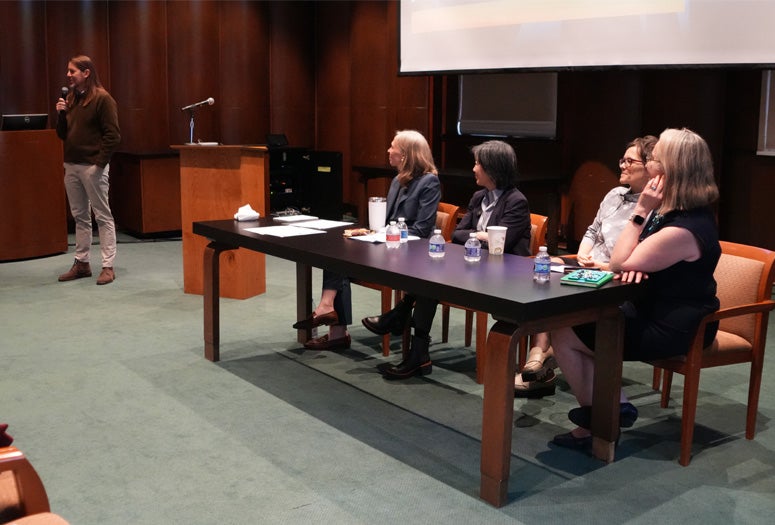
“We hope that this simply opens the conversation,” said Julie Fette, associate professor of French studies, as she kicked off “American Democracy Through Foreign Eyes” Jan. 30. The Scientia Institute event held in the Kyle Morrow Room at Fondren Library featured insights on China, Russia, France and Mexico, offering comparative viewpoints on how the U.S. democratic system is perceived beyond its borders.

The panelists — Fette; Anne Chao, adjunct lecturer in the humanities; Lida Oukaderova, associate professor of art history; and Moramay López-Alonso, associate professor of history — have collectively created the massive open online course “America Through Foreign Eyes” for Coursera, which has enrolled nearly 19,000 students worldwide. The panel was part of Scientia’s 2024-25 lecture series on democracy, a theme addressing contemporary challenges to representative government.
Chao explored how China’s political traditions and history shape perceptions of American democracy. Rooted in Confucian cosmology, Chinese political thought traditionally prioritizes hierarchical order over the egalitarian principles championed by Western democracies. While the U.S. was once a model for reformers in early 20th-century China, skepticism toward American governance grew in the aftermath of events such as the Treaty of Versailles in 1919 and later the 1989 Tiananmen Square crackdown, which exacerbated Chinese wariness of Western democratic models.
“Democracy is actually a very foreign concept for the Chinese because even after all these years of revolution, China’s worldview today is still very much influenced by Confucian cosmology,” Chao said. “The Confucian cosmology basically says that the ruler brings about the moral transformation of the people by his own rectitude and by his ritual performance.”
The perception of U.S. democracy took another hit with president Donald Trump’s indictment, Chao noted, citing Chinese media’s reaction.
“One source said that, ‘Although he is guilty, he can still run for president. A criminal can become president. Isn’t it a ridiculous aspect of American-style democracy?’” Chao said, showing headlines and clippings from Chinese reports. “China Daily said, ‘The West won the world not by the superiority of its ideas, values or religion, but rather by superiority in applying organized violence. Westerners often forget this fact. Non-Westerners never do.”

Oukaderova traced how Russian views of American democracy have shifted over time. In the early 1990s after the Soviet Union’s collapse, Russia looked to the U.S. as a potential partner in rebuilding its political and economic institutions. However, perceptions soured as Russia blamed Western economic advisers for the hardships of the 1990s. NATO’s expansion and the 1999 bombing of Yugoslavia further deepened anti-American sentiment.
“Generally, there is a great sense of unfairness in the way the United States treats Russia,” Oukaderova said. “The U.S. media’s obsession with Russia’s abuses of human rights is considered to be highly hypocritical, and the Russian media in turn constantly talks about how easily the United States turns a blind eye towards its own abuses of human rights”
She highlighted Vladimir Putin’s 2007 Munich speech in which he criticized the U.S. for its unilateral actions on the world stage.
“Putin lashed out at American democracy, and he said, ‘Russia is constantly being taught about democracy, but for some reason those who teach don’t want to use themselves,’” Oukaderova said. “What he meant by that is that the U.S. cannot be considered a democratic country if it does not act democratically on an international stage.”

Fette examined France’s long-standing but complex relationship with American democracy. France has often been both an admirer and a critic of America’s political system. French intellectuals have historically debated whether the U.S. represents a successful democratic model or a cautionary tale, and Fette pointed to Alexis de Tocqueville’s “Democracy in America” as a reference point.
“We’ve had our antagonisms, but France and the U.S. have been longtime friends,” Fette said. “France was the first ally of the U.S. during the American Revolution, providing arms, loans and troops … and the French were amazed to see democracy firmly implanted across the Atlantic when the new nation was just 53 years old.”
She noted that Tocqueville’s warnings about the tyranny of the majority remain relevant.
“The feared tyrant is no longer a king but an omnipotent majority,” Fette said. “In a democracy, that could become just as oppressive.”
In France, Fette called democracy “imperfect in many ways,” explaining that there’s been a fair amount of democratic backsliding and authoritarian drift.
“It’s also under threat from extreme right populist movements both inside and outside its borders,” Fette said. “The European Union happens to be very weak right now because Germany and France are in the midst of major leadership changes … so the evolutions in American democracy that we are witnessing could be a trigger.”

López-Alonso addressed Mexico’s perspective, emphasizing that its view of American democracy is shaped by geography, history and economic interdependence.
“The relationship between Mexico and the United States is one of, say, forced marriage and much inequality,” López-Alonso said. “Mexicans respect American democracy. They respect the way the United States has established democracy. But they don’t think of democracy in the same way as the United States.”
She pointed to key moments in history such as the Mexican-American War, which left a lasting sense of territorial loss and power imbalance.
“Mexico and the United States have shared different experiences in their colonial legacies, their historical past and their economic performance,” López-Alonso said. “That explains why, despite being neighbors, the relationship has evolved in a very different way.”
Mexican leaders tend to avoid publicly critiquing U.S. governance, López-Alonso said, prioritizing diplomatic stability over ideological disputes.
“For Mexicans, the U.S. is both an essential trade partner and a source of economic coercion,” she said.
The panelists agreed that analyzing American democracy through foreign perspectives reveals its complexities, contradictions and global impact. While each country examined in the discussion has its own unique political traditions, common themes emerged: doubts about U.S. political stability, concerns over polarization and skepticism about America’s moral authority in promoting democracy abroad.
To learn more about upcoming Scientia Institute events, click here.

